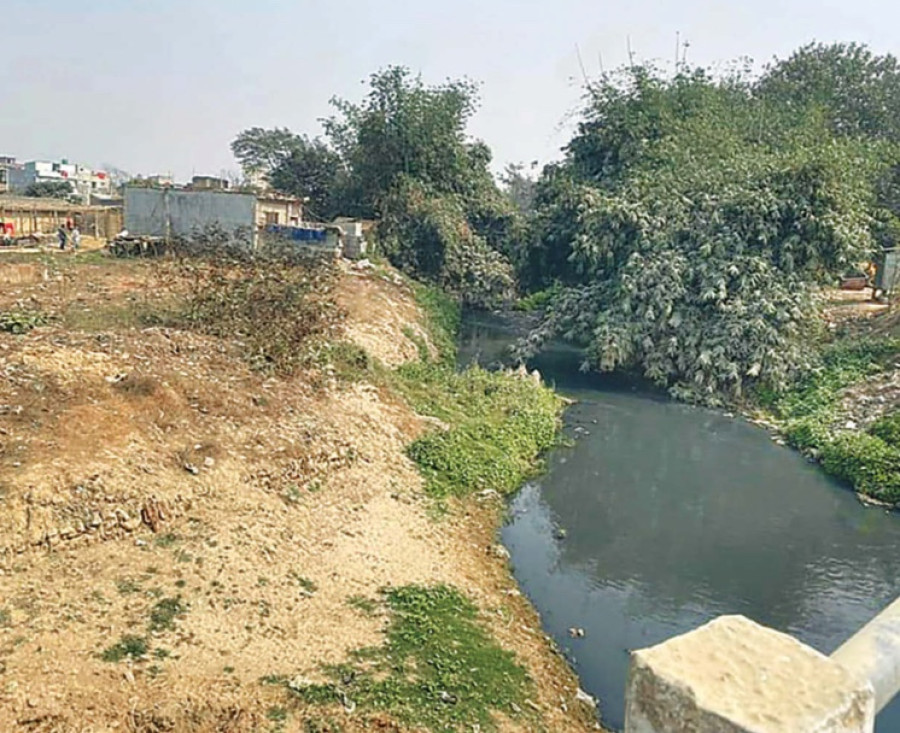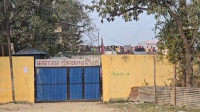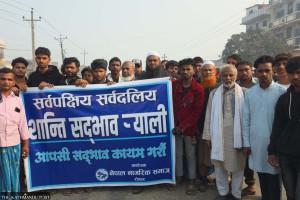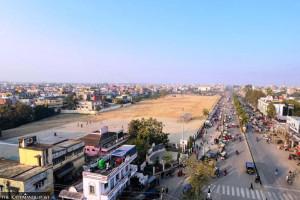Madhesh Province
Simara residents padlock warehouse of steel foundry over pollution issue
The conflict has escalated as more people are now living close to the industrial area, industrialists say.
Shankar Acharya
On Wednesday, the local residents of Simara in Bara padlocked the warehouse of Jagdamba Steels. According to them, there is a small plant within the warehouse facility that causes incessant noise and vibration disturbance.
“The disturbance is unbearable. Houses that are closer to the warehouse have developed cracks because of the tremor caused by large machines operating inside,” said Hira Basnet, a local man. “Earlier, the place used to be a storage but now it has turned into a full-fledged factory.”
Resham Tiwari, another resident from the area, said they have been requesting the local authorities to control the noise pollution level, but without any success.
“None of the authorities has paid attention to our concerns. We have to resort to protest and padlock the facility because we see no other option,” said Tiwari.
Jagdamba Steels, meanwhile, claims that the company has taken necessary measures to control pollution levels at its facilities.
“We have installed equipment to control pollution in our industrial area. The local people are wrong in claiming that we are causing pollution,” said Jagdamba CEO Anurag Sharma. “Our steel industry employs over 3,200 labourers. The protest by the locals has made the working environment unfavourable.”
There are other industries in the Parsa-Bara Industrial Corridor that have been facing obstruction from locals from time to time.
Around five years ago, local residents of Parwanipur staged a demonstration against environmental pollution caused by Narayani Oil and Trishakti Cement Industry. Following the protest, the company installed a plant to control pollution.
Jas Pal Singh, an environmentalist based in Birgunj, says industries should adopt scientific methods in order to lower their pollution levels.
“They should begin by at least replacing old machines. Both business entrepreneurs and local authorities should take initiatives to control pollution,” he said.
Bhim Kanta Paudel, assistant chief district officer of Parsa, says legal action can be taken against the industries in question if the local residents file an official complaint.
“So far we have not received any official complaints against the industries,” he said.
Currently, there are over 1,000 small, medium and large scale industries operating in the Parsa-Bara Industrial Corridor, which spans about 25 km from Birgunj to Pathalaiya.
The industry operators have been demanding that the government officially declare the area an industrial corridor.
According to Subodh Kumar Gupta, chairman of Birgunj Chamber of Commerce and Industry, the industrial corridor is not supposed to have human settlements.
When the corridor was set up around 40 years ago, he said there were settlements only in Jitpur, Simara, Parwanipur, Pathalaiya and Chhatapipra.
“Now more people are moving into the industrial area, leading to confrontations between the settlers and the industries. The area is not meant for residential purpose,” said Gupta.
The Birgunj Chamber of Commerce and Industry has long been urging the government authorities to formally declare the Parsa-Bara Industrial Corridor as an industrial area.
Gopal Kedia, the immediate past chairman of the chamber, said that the business organisations have repeatedly made the request to the government but to no avail.
“It will be enough if only the government made the declaration and prohibited construction of residential buildings close to the industrial area,” said Kedia.




 13.16°C Kathmandu
13.16°C Kathmandu















